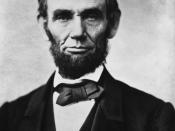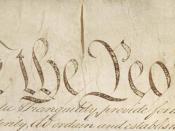As the seasons gradually pass from the blooming spring to the dark depths of winter, the leaves on the trees begin to wither, changing in color from a vibrant green to a waning yellow, slowly merging with the poignant red pigments, to an eventual decay of brown. Nothing lasts forever in this world of constant change. But even in the steady spectrum of change, there exists an ideal model that reflects an exact moment in time, just as that certain shade of green may signify a certain moment in spring. And likewise, in the lifetime of the United States there has been a succession of presidential inaugural addresses with each reflective of a specific crisis in history: war, depression, or internal strife. However, it was not the inaugural speeches that defined the crisis of the moment, but the crisis that has influenced the content of the inaugural speeches. Thus the intent of George Washington's inaugural speech was to address the crisis of the moment, not to establish an example for all successive inaugural speeches.
The latter is a misconception resulting from the fact that Washington's inaugural was the very first.
First and foremost, Washington faced a crisis: a growing fear among the public that the government may change into a tyrannical institution. This fear originated in the tumultuous past shared between the United States, formerly known as the thirteen colonies, and Great Britain. Under the tyrannical rule of the British Crown, the colonies were subjected to constant neglect, manipulation, and discrimination. Although the colonies humbly protested, their petitions were ignored, and oppression continued. The unrelenting injustice inexorably led to the American Revolution, resulting in a new nation, and more importantly, a new government. However, the experimental nature of the new government gave rise to public doubt in the ability of...


![[Unidentified young soldier in Union uniform and forage cap] (LOC)](https://s.writework.com/uploads/9/99956/unidentified-young-soldier-union-uniform-and-forage-cap-loc-thumb.jpg)